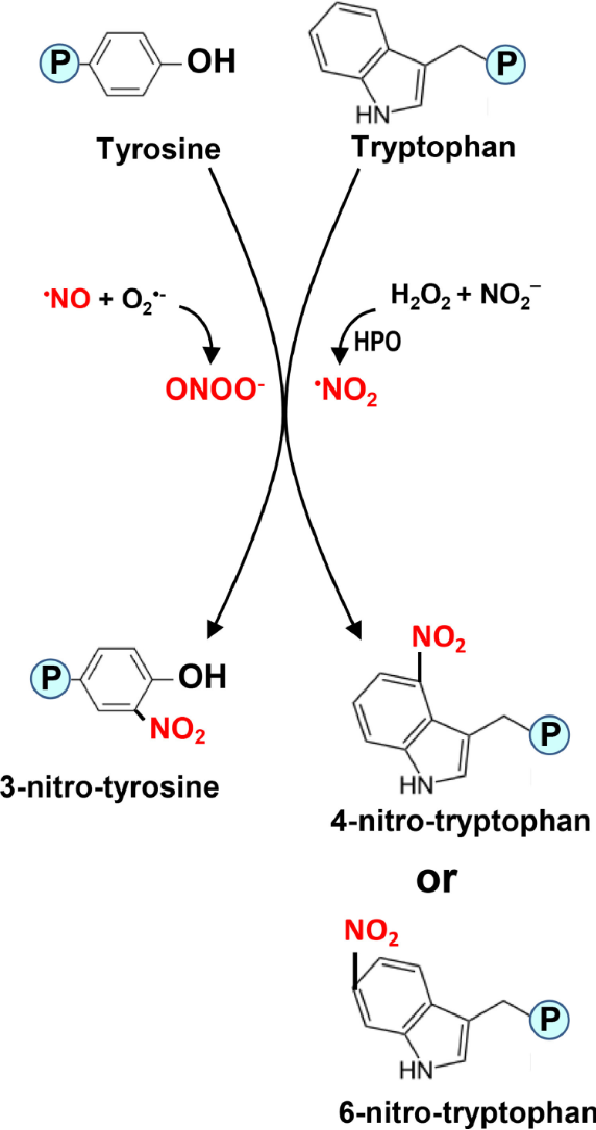Nitration Analysis Service
Protein nitration is a critical post-translational modification in which a nitro group is covalently added to specific amino acid residues, most commonly tyrosine, under conditions of oxidative or nitrosative stress. This modification alters protein structure and function, with broad implications for cellular signaling, metabolism, and disease.
MtoZ Biolabs offers a comprehensive Nitration Analysis Service that combines selective enrichment strategies, high-resolution mass spectrometry, and advanced bioinformatics. Our platform supports both targeted nitration analysis of specific proteins and global nitroproteomics profiling to deliver quantitative and site-specific information. Clients simply submit their samples, and we handle every step from sample processing to data interpretation, providing a complete solution for the identification, quantification, and functional analysis of nitrated proteins.
1. Target Protein Nitration Analysis
This service is tailored for researchers investigating nitration on a specific protein of interest. By applying targeted enrichment approaches, such as anti-nitrotyrosine immunoprecipitation or chemical derivatization, followed by high-resolution LC-MS/MS, we precisely detect and quantify nitration sites within the target protein.
2. Nitration Proteomics
For broader studies, MtoZ Biolabs offers proteome-wide nitration profiling. Combining optimized sample preparation with high-throughput LC-MS/MS analysis, this approach systematically identifies nitrated proteins across the proteome, quantifies modification abundance, and maps affected biological pathways. The resulting data provide a global perspective on nitration dynamics and their association with oxidative stress, metabolic imbalance, and disease mechanisms.
What is Nitration?
Protein nitration occurs primarily through the formation of 3-nitrotyrosine, resulting from the interaction of reactive nitrogen species (RNS) with tyrosine residues. Peroxynitrite, generated by the reaction of nitric oxide (NO) and superoxide radicals, is the major mediator of this modification. Beyond tyrosine, nitration can also affect tryptophan, cysteine, and other residues, though these are less frequent.

Corpas, F. J. et al. Plant Stress. 2021.
Figure 1. Simple Model of Protein Tyrosine and Tryptophan Nitration
Functionally, nitration can disrupt enzyme activity, alter protein–protein interactions, and modulate signaling pathways. It has been widely reported in vascular biology, neurobiology, and immunology, where it serves both as a regulator of normal physiology and as a marker of pathological processes. For example, nitration of mitochondrial proteins can impair energy metabolism, while nitration of signaling proteins can contribute to abnormal cellular responses.
From a clinical perspective, nitrated proteins are associated with cardiovascular disease, diabetes, chronic inflammation, cancer, and neurodegenerative disorders such as Alzheimer's and Parkinson's disease. The modification has therefore gained significant attention as a biomarker of oxidative stress and as a potential therapeutic target.
Given its importance and complexity, accurate detection and quantification of protein nitration require highly sensitive and specialized analytical methods. This is precisely what MtoZ Biolabs provides through its integrated nitration analysis platform.
Analysis Workflow

Sample Submission Suggestions
1. Sample Types
Cells, tissues, plasma, serum, or purified proteins are acceptable. If you plan to submit other types of samples, please contact us in advance for tailored preparation guidance.
2. Sample Handling
Avoid exposure to high oxidative or reducing agents that may alter nitration status.
3. Storage
Flash-freeze samples in liquid nitrogen and store at –80°C.
4. Shipping
Ship samples on dry ice to preserve integrity.
5. Replicates
Provide biological replicates to enable reliable statistical analysis.
Service Advantages
✅ Sensitive enrichment strategies tailored for low-abundance nitrated peptides
✅ High-resolution LC-MS/MS platforms ensuring precise site identification
✅ Customizable workflows designed to meet specific research objectives
✅ Expertise in handling diverse sample types, including clinical specimens
✅ Experienced team with a strong background in PTM proteomics
Applications
Nitration analysis supports a broad range of research applications:
1. Redox Biology: Investigation of nitration as a key oxidative modification regulating protein function.
2. Signal Transduction: Analysis of nitration-mediated modulation of receptors, kinases, and transcription factors.
3. Disease Mechanisms: Characterization of aberrant nitration patterns in cardiovascular disease, cancer, and neurodegenerative disorders.
4. Biomarker Discovery: Identification of disease-associated nitrated proteins for diagnostic and prognostic applications.
5. Therapeutic Research: Assessment of drug effects on nitrated proteins and evaluation of therapeutic strategies targeting oxidative pathways.
Deliverables
1. Comprehensive Experimental Details
2. Materials, Instruments, and Methods
3. Total Ion Chromatogram & Quality Control Assessment
4. Data Analysis, Preprocessing, and Estimation
5. Bioinformatics Analysis
6. Raw Data Files
If you are interested in our Nitration Analysis Service, please feel free to contact us. Our technical specialists are available to provide a free business assessment.







